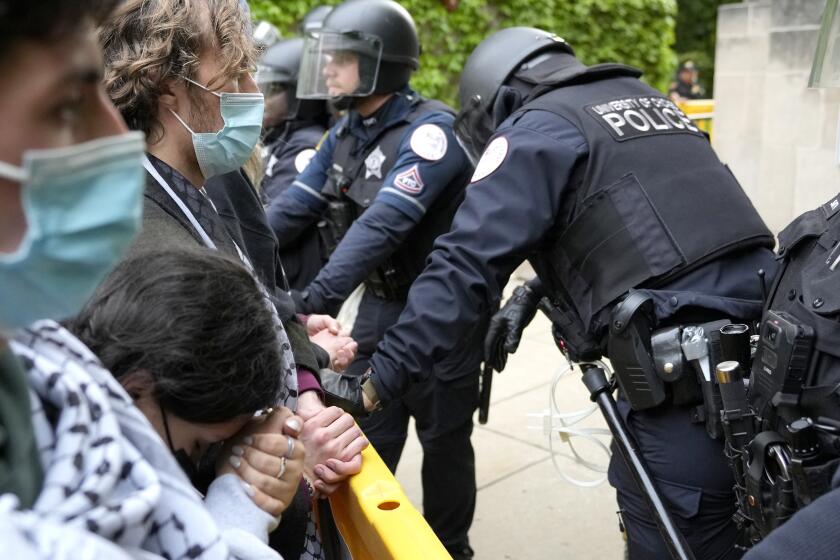Couple May Remain in Home : School to Redeem Family’s Promise
When a private school stepped in last year to buy the Scripps Hall mansion in old Altadena, the move was applauded by community leaders who had waged an impassioned battle to save the turn-of-the-century home from a developer’s wrecking ball.
However, in the glow of celebration that accompanied the purchase by the Waldorf School of Pasadena, little thought was given to what would become of a Japanese couple who, for 50 years, had lived in a small cottage on the estate and tended the sprawling five-acre grounds.
Unknown to school officials at the time of the sale was a decades-old promise from the Scripps-Kellogg family to the Japanese couple, the Yuges.
Saying the family had assured them lifetime, rent-free residence in the caretaker cottage, the Yuges refused to vacate the property or relinquish an azalea-growing business on a surrounding acre of estate land.
Strengthening their conviction was the painful memory of being forced from the cottage once before during the mass detention and confinement of Japanese-Americans during World War II.
“They were adamant, and it was understandable given their experiences during the war,” said Paul J. Livadary, chairman of the board of trustees that runs the private nondenominational school.
After more than a year of negotiations, an agreement was reached recently that will allow the Yuges, who are in their 70s, to live the remainder of their lives in the cottage.
However, the search for a resolution has delayed the school’s opening from the fall of 1986 until this September. And the subsequent agreement has forced the school--which offers classes from preschool to the 7th grade and will add an 8th grade next year--to limit plans for clearing part of the grounds and building play fields.
Livadary said because of the space taken up by the cottage and flower farm, 90 grammar and middle-school students who will begin classes this fall will not have enough room to play some organized sports.
“The deal will make life somewhat difficult for us,” Livadary said. “But we have grown very fond of the Yuges, who are fine and proud people. And we’re hopeful over time that their horticulture activities will be something of great interest and educational value to our students.”
For the Yuges, the year of uncertainty has brought to the fore old fears and bitter, painful recollections.
They say they are grateful that the school has allowed them to stay, particularly since the promise from the Scripps-Kellogg family was never in writing and probably lacked legal weight. But they wish the whole matter had never surfaced.
Mrs. Yuge declined to give either her or her husband’s first name. She talked briefly, haltingly, about the family’s six-year internment during World War II.
“Everything we had, we lost,” she said. “My oldest daughter was on formula when we were forced from our home. We were taken on a old rickety train and when we disembarked in Tulare, Calif., the soldiers faced us with their guns and bayonets.
Born in California
“We were American citizens. Both my husband and I were born in California. But we had to live next to a race track that reeked with the smell of horse manure. There were mosquitoes and horse flies.
“Then we were moved to Arizona. The place was better, but the bathrooms still didn’t work and the water was heavily treated to kill the germs. It tasted terrible.”
In 1947, with the war over, the Yuges were allowed to return to the cottage and their old way of life. In the ensuing years, they raised and sent to college four children, tended the mansion grounds and worked hard to expand their flower business.
In 1978, William Scripps Kellogg deeded the mansion and grounds as a gift to the Scripps Home, a retirement facility a mile from the mansion that was founded by the family but is now run by a 24-member board.
The Yuges promptly found themselves caught in the middle of a dispute between members of the family that had promised them lifelong residence and administrators of the old-age home who intended to sell the estate to the highest bidder.
The Scripps-Kellogg family, a patrician clan that made its fortunes in the newspaper business before endowing Scripps College in Claremont and the Scripps Institution of Oceanography in La Jolla, adamantly opposed the sale of the vacant mansion to developers. They argued that the home was historically important to Altadena and should be preserved as a community and cultural center.
No Restrictions
Administrators of the old-age home responded that the family placed no restrictions at the time the gift was made and they were free to sell it.
For nearly two years, first privately and then in full public view, family members fought alongside community leaders to block a sale.
In March, 1986, just as administrators of the old-age home were negotiating with developers, the Waldorf School came in with a last-minute offer to buy the mansion and grounds for roughly $700,000. Faced with community pressure, the 24-member board accepted the offer.
School officials, anticipating a new and bigger campus, called the purchase a “dream come true” and pledged to maintain the four-story, red-brick structure in its original state.
William C. Kellogg, who grew up in the home built in 1904 by his great grandfather, community pioneer W. A. Scripps, called it a “great compromise” between those favoring development and those wanting to preserve the mansion as a community center.
After acquiring title, the school tried to negotiate with the Yuges. But the couple held firm.
“We offered to let them stay five years and to provide them with housing in the Scripps retirement home,” Livadary said. “We even tried looking for another home with an acre lot. But they wouldn’t budge.
“We weren’t about to kick them out. It never got personally ugly, but it was difficult trying to find something we could both live with. Finally, we agreed to the status quo.”
Livadary said the mansion and grounds are perfectly suited for the school, which was founded locally in 1979 and is one of 350 Waldorf schools worldwide.
Arts in Education
The Waldorf program incorporates the arts into all subjects, Livadary said, teaching history and other subjects through school drama productions. Students are required to learn German and Spanish and play a musical instrument. The children create some of their own textbooks.
Livadary said the school has hired a well-known architect, University of California, Berkeley, professor Christopher Alexander, who envisions classrooms in a cottage-like setting surrounded by gardens. The mansion, which will be the centerpiece of the school, will house the library and administrative offices.
Livadary said several of the classrooms should be done in time for the 1988 school year. The total project’s cost is estimated at $2 million.
In the meantime, the school’s 90 students will attend makeshift classes in the mansion, which has undergone extensive repairs and the removal of asbestos.
“We’re looking forward to moving in,” Livadary said. “We’re coexisting with the Yuges very well. We’re happy to be there and we hope they’re happy to have us.”
More to Read
Start your day right
Sign up for Essential California for news, features and recommendations from the L.A. Times and beyond in your inbox six days a week.
You may occasionally receive promotional content from the Los Angeles Times.






